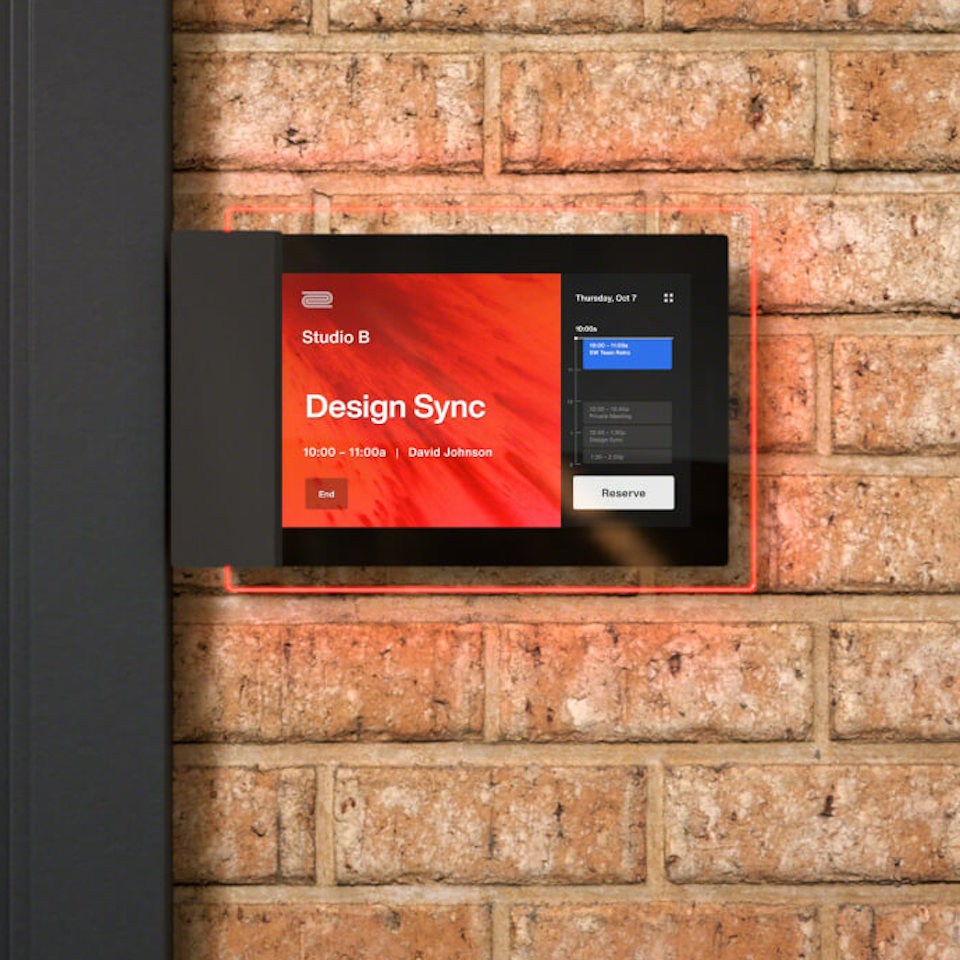Desk management refers to a system put in place to manage desk usage in a workplace where staff don’t necessarily have their own assigned stations or fixed seats.
It is the same principle as room booking, which manages the occupation of things like meeting rooms and collaboration spaces, using technology such as software, sensors and online booking systems. It’s not an entirely new concept but something that has gained popularity at pace in the wake of the pandemic.
Now that many businesses are adopting a hybrid, or blended, approach to where and when employees work, desk management and room booking serves to monitor and control footfall, space occupancy and capacity.
Room booking and desk management systems are also particularly appealing to those businesses that have downsized their physical workspace in order to evolve with hybrid and remote working. In a smaller office, it’s more important than ever that what space is available is managed efficiently—but more on the benefits of desk and room management in just a moment.
How room and desk booking works in a hybrid office
How the desk management and room booking process works really depends on the system and the software in place. There are a whole host of different services and software on the market and each offer various different features.
However, there is a number of common features that you’ll typically find available when choosing your software system, such as:
- Custom floor plans
- Search by colleague or team so location can be selected accordingly
- Integrations with calendar apps such as MS Office, Outlook and Google
- Auto booking to remove manual effort
- Attendance notifications
- Visitor management tools
- Remote, app-based booking so spaces can be booked anytime, anywhere
Some of the most sophisticated systems even offer real-time views of the workspace so employees can act spontaneously and intuitively, rather than just scheduling ahead.
The benefits of room booking and desk management
We touched on some of the main benefits of room booking and desk management earlier but let’s look at these in more detail to establish how this kind of workplace tech could support your workforce.
Downsizing physical space without impacting productivity or wellbeing
Reducing the physical footprint of their business is something many business owners are doing in order to contribute to both sustainability efforts as well as cost-cutting. A smaller office space means a reduced carbon footprint, reduced energy consumption and of course, reduced overheads.
Having a room booking and/or desk management software system in place means you can better manage and control the occupancy of your reduced physical space. This will allow you to maintain a comfortable capacity, while still fostering a working environment that encourages optimal productivity and wellbeing.
Helping employees use the space more flexibly and intuitively
We’ve explored previously how the days of designated desks are over and since the pandemic, that idea is more true than ever. Working from home, hybrid working, remote working and all of the other modern modes of work that have been catalysed over the past couple of years call for equally more flexible workspaces.
There are a whole plethora of ways in which this flexible approach to working benefits both employer and employee—but what’s important to highlight here is how vital it is that the physical environment supports this.
Room booking and desk management enable you to implement flexible and agile working in an efficient and strategic way, so you can support staff most effectively. It allows you to provide them with more choice and control so that they can pick their working environments according to task and requirement, rather than what is dictated to them by fixed work settings.
Giving you a better understanding of your office space is being utilised
Many of the software options available will provide information about space usage and capacity. You can use this to create reports and analyse how the physical space is being occupied and utilised—helpful insights that can be used to inform how you design, resource and develop your working environment moving forward.
If your usage insights tell you that meeting rooms are regularly at full capacity but hot desks are less popular, for example, this might mean you need to swap some desk banks for more breakout and collaboration settings. This information will help you design a workspace that works harder for you and your team.
Attracting and retaining new generations of talent
Creating workspaces that are considered and forward-thinking will also help you attract and retain new generations of talent. Younger people entering the workplace will expect to see more innovative and modern ways of working, as opposed to the traditions that they’ve never been used to in the same way older generations have.
Room booking and/or desk management software system is a great way to demonstrate flexibility and adaptability in a way that still offers structure and support.
It’s important to assess the features of the software you’re considering carefully to ensure you’re investing in the right product and installing a system that is going to work for you and your employees.
If you’d like some guidance from an expert, speak to our resident Technology Specialist, Martin by calling 0151 737 5000 or by requesting a callback.




